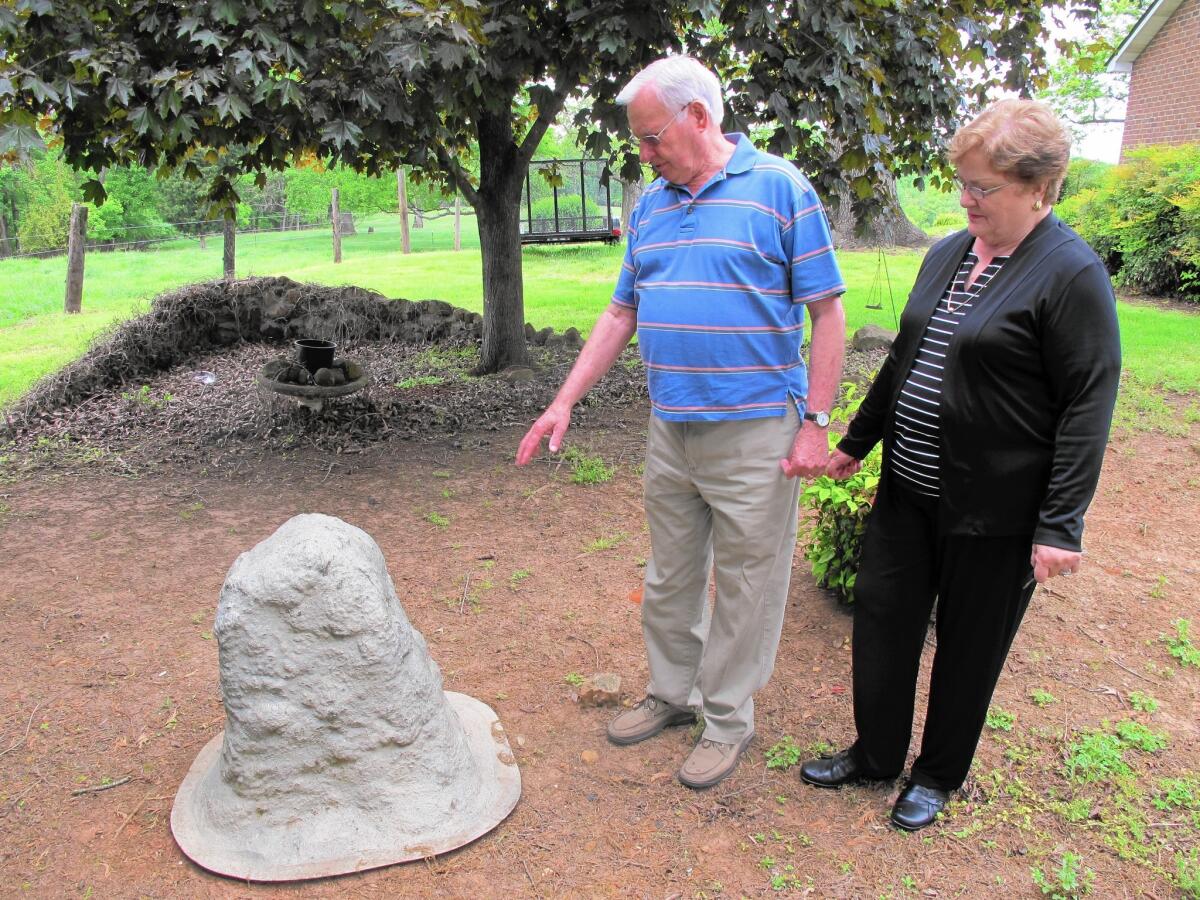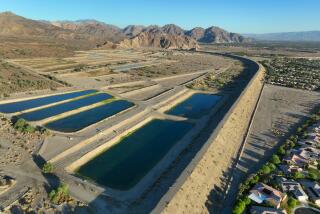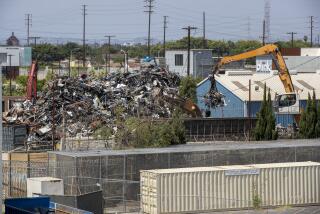Coal ash contamination upsets residents near North Carolina plants

Ron and Joann Thomas on their property near an electricity plant in Salisbury, N.C. They have been warned not to drink their well water because of contamination concerns.
As a boy, Ron Thomas often watched murky water pour from a pipe into the Yadkin River behind his family’s farmhouse, dumped from coal ash storage ponds at Duke Energy’s Buck electricity plant.
Now 80, Thomas worries that he and his wife, Joann, 72, have for decades been drinking well water contaminated by the ponds. On April 22, the couple received a letter from state health authorities warning them not to drink or cook with their well water because of elevated levels of a carcinogen.
The well at the couple’s pre-Civil War farmhouse is just 400 feet from the coal ash ponds. The grayish water is visible from the grassy pasture behind their home.
Like other residents who live near Duke Energy’s 32 coal ash storage sites in North Carolina, the Thomases would not have known about the contaminants if not for a massive spill of coal ash from a Duke plant in Eden, N.C. In February 2014, 39,000 tons of coal ash and 27 million gallons of ash slurry coated the Dan River with thick sludge for 70 miles.
The spill focused public and political attention on Duke’s 130 million tons of coal ash, which environmentalists have warned for years have been polluting rivers, streams and groundwater with toxic ash.
State legislators responded to the spill by requiring Duke to clean up its coal ash ponds at 14 power plants — and requiring testing of private wells near ash ponds.
Duke Energy is negotiating a guilty plea in federal court to nine misdemeanor criminal violations of the Clean Water Act at the Dan River plant and four other Duke power plants. It has set aside $102 million to pay fines under a plea deal expected to be completed in federal court May 14.
The nation’s largest electric utility also faces lawsuits from environmentalists and four lawsuits from state regulators over coal ash, the potentially toxic residue left after coal is burned for electricity.
But that is little solace for Ron and Joann Thomas and their neighbors in the community known as Dukeville.
The Thomases now fear their health is endangered and the value of their lovingly restored home and 50 acres of rolling farmland badly diminished by fears of poisoned groundwater.
“It scared us, of course,” Joann said of the warning letter. “We’ve been drinking that water for years, and now we find out it’s contaminated.”
Her husband said that blood tests by a doctor showed elevated levels of dangerous substances in his body, including lead and mercury. The letter from state health authorities said tests of groundwater near the couple’s well showed elevated levels of chromium-6 and vanadium.
Chromium-6 can cause stomach, liver or lung cancer, the letter warned. Vanadium can cause lung damage, bronchitis and eczema, according to the letter from the North Carolina Department of Health and Human Services.
At least 146 residents living near coal ash ponds statewide received letters warning of dangerous compounds — including lead, manganese and iron — at levels exceeding state standards, including 32 at Dukeville, according to the state Department of Environment and Natural Resources. The agency tested for nearly 30 heavy metals and other compounds.
Duke Energy says elements detected in testing occur naturally. The state environmental agency said many compounds “may be naturally occurring or unrelated to coal ash ponds.”
“Based on the state’s test results we’ve reviewed thus far, we have no indication that Duke Energy plant operations have influenced neighbors’ well water,” Erin Culbert, a Duke Energy spokeswoman, said in an email.
Culbert said the utility was willing to provide bottled water on a temporary basis to residents concerned about water quality.
She said Duke would consider extending municipal water lines to affected residents in Salisbury and elsewhere “if the groundwater assessment we are performing shows neighbors’ wells have been influenced by plant operations.”
The Thomases said they had no idea that harm could come from coal ash at the Buck station, named for James Buchanan “Buck” Duke, the company cofounder. It was only after the Dan River spill that they became concerned enough to have their water tested by environmentalists.
Though the Dan River spill was 85 miles from Salisbury, it galvanized residents of Dukeville. The Thomases were among more than 200 residents who confronted Duke Energy officials during a public meeting at a volunteer fire hall a few weeks after the Feb. 2, 2014, spill.
“They really were not happy we had that meeting,” Joann said of the Duke officials. “They were there to defend themselves and tell us nothing was wrong — all this was naturally occurring and there was nothing to be concerned about.”
The Thomases and other Dukeville residents have hired a local lawyer, Bill Graham, to deal with the issue. Asked whether he intended to sue the utility, Graham replied, “It depends on what Duke does.”
Among neighbors who have received warning letters about their drinking water are current and former Duke Energy employees, Ron Thomas said. “Some of them are upset with us because we keep pushing this thing,” he said.
His wife added, “But a lot of them are starting to come around as they get more information about what’s really going on with those ash ponds.” Graham said his coal ash clients included former Duke employees.
Peter Harrison, an attorney with Waterkeeper Alliance, said three samples he took from the Thomases’ tap water and groundwater showed elevated levels of chromium-6. He said tests of other Dukeville wells showed even higher levels.
Harrison said he also found seepage sites on the Thomas pasture land where coal ash water was bubbling to the surface.
The warning letter noted that the Thomases’ water still met federal standards for public drinking water. But Harrison said that was misleading because the federal standards apply to municipal water systems, which have sophisticated treatment facilities that don’t exist in private wells.
“Those letters created a lot of confusion and left a lot of residents baffled,” Harrison said.
Jamie Kritzer, a spokesman for the state environmental agency, said the agency applied state groundwater standards, which in most cases are more restrictive than federal standards. For instance, he said, the state standard for chromium-6 in groundwater is 10 parts per billion, versus the federal standard of 100 parts per billion.
For Ron and Joann Thomas, the news of their tainted water only heightened their suspicions of Duke Energy.
They said the utility never warned them of the dangers of living next to coal ash ponds, even as they paid their Duke Energy monthly bill from the day in 1939 when Duke installed electricity in their farmhouse. Ron Thomas said his father sold Duke part of his property in the 1950s when the utility expanded its Buck plant.
The fact that Duke may pay a $102-million fine for illegal discharges of coal ash slurry at five plants does not impress Joann Thomas.
“In this day and time, that’s not all that much for the damage they’ve done to people,” she said. “They just don’t feel responsible. They just keep saying this is not something they caused.”
Culbert, the Duke spokeswoman, said, “We began apologizing immediately after the spill and will continue to do so and hope our actions in response to all this earn our customers’ trust.”
Joann Thomas said no apology or fine could restore the value of their home, given the tainted water in their well. She said the house is probably unsellable.
“The value of our house and property has gone way down,” Joann Thomas said. “Nobody would want to move into a situation like we have.”
Twitter: @davidzucchino
More to Read
Start your day right
Sign up for Essential California for news, features and recommendations from the L.A. Times and beyond in your inbox six days a week.
You may occasionally receive promotional content from the Los Angeles Times.







